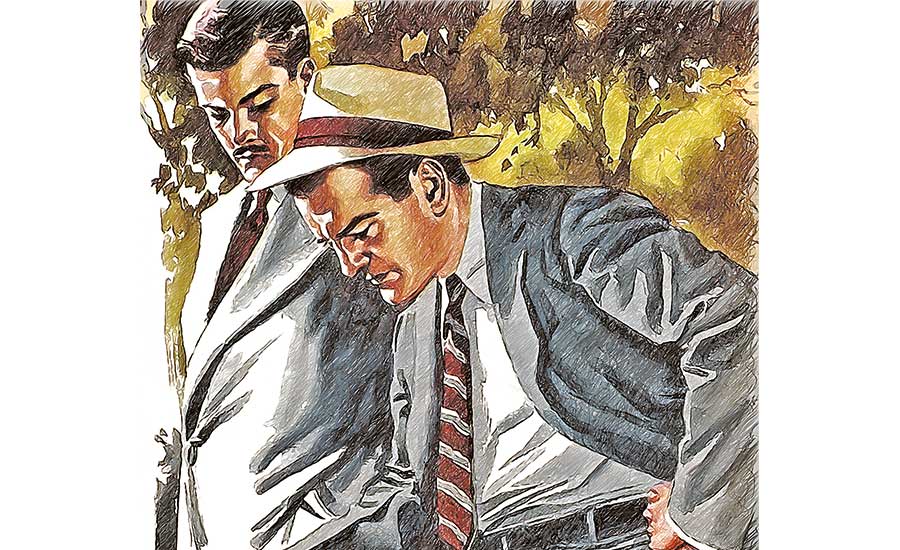An Epidemic
- 13 Apr - 19 Apr, 2024

This first document I soon laid aside, both because I found that its provisions were dependent for their meaning upon the second, and because to this second document I looked with confidence for a solution of many mysteries; – of the profound sadness which had, from the first of my acquaintance with him, possessed a man so gorgeously endowed as the favourite of nature and fortune; of his motives for huddling up, in a clandestine manner, that connection which formed the glory of his life; and possibly (but then I hesitated) of the late unintelligible murders, which still lay under as profound a cloud as ever.
Much of this WOULD be unveiled – all might be: and there and then, with the corpse lying beside me of the gifted and mysterious writer, I seated myself, and read the following statement: "MARCH 26, 1817. My trial is finished; my conscience, my duty, my honour, are liberated; my 'warfare is accomplished.' Margaret, my innocent young wife, I have seen for the last time. Her, the crown that might have been of my earthly felicity – her, the one temptation to put aside the bitter cup which awaited me – her, sole from the stern duties which my fate had imposed upon me – her, even her, I have sacrificed. "Before I go, partly lest the innocent should be brought into question for acts almost exclusively mine, but still more lest the lesson and the warning which God, by my hand, has written in blood upon your guilty walls, should perish for want of its authentic exposition, hear my last dying avowal, that the murders which have desolated so many families within your walls, and made the household hearth no sanctuary, age no charter of protection, are all due originally to my head, if not always to my hand, as the minister of a dreadful retribution.
"That account of my history, and my prospects, which you received from the Russian diplomatist, among some errors of little importance, is essentially correct. My father was not so immediately connected with English blood as is there represented. However, it is true that he claimed descent from an English family of even higher distinction than that which is assigned in the Russian statement. He was proud of this English descent, and the more so as the war with revolutionary France brought out more prominently than ever the moral and civil grandeur of England. This pride was generous, but it was imprudent in his situation. His immediate progenitors had been settled in Italy – at Rome first, but latterly at Milan; and his whole property, large and scattered, came, by the progress of the revolution, to stand under French domination.
Much spoliation he suffered; but still he was too rich to be seriously injured. But he foresaw, in the progress of events, still greater perils menacing his most capital resources. Many of the states or princes in Italy were deeply in his debt; and, in the great convulsions which threatened his country, he saw that both the contending parties would find a colourable excuse for absolving themselves from engagements which pressed unpleasantly upon their finances. In this embarrassment he formed a relationship with a French officer of high rank and high principle. My father's friend saw his danger, and advised him to enter the French service. In his younger days, my father had served extensively under many princes, and had found in every other military service a spirit of honour governing the conduct of the officers. Here only, and for the first time, he found ruffian manners and universal rapacity. He could not draw his sword in company with such men, nor in such a cause. But at length, under the pressure of necessity, he accepted (or rather bought with an immense bribe) the place of a commissary to the French forces in Italy. With this one resource, eventually he succeeded in making good the whole of his public claims upon the Italian states. These vast sums he remitted, through various channels, to England, where he became proprietor in the funds to an immense amount. Incautiously, however, something of this transpired, and the result was doubly unfortunate; for, while his intentions were thus made known as finally pointing to England, which of itself made him an object of hatred and suspicion, it also diminished his means of bribery.

These considerations, along with another, made some French officers of high rank and influence the bitter enemies of my father. My mother, whom he had married when holding a brigadier-general's commission in the Austrian service, was, by birth and by religion, a Jewess. She was of exquisite beauty, and had been sought in Morganatic marriage by an archduke of the Austrian family; but she had relied upon this plea, that hers was the purest and noblest blood among all Jewish families – that her family traced themselves, by tradition and a vast series of attestations under the hands of the Jewish high priests, to the Maccabees, and to the royal houses of Judea; and that for her it would be a degradation to accept even of a sovereign prince on the terms of such marriage.
This was no vain pretension of ostentatious vanity. It was one which had been admitted as valid for time immemorial in Transylvania and adjacent countries, where my mother's family were rich and honoured, and took their seat among the dignitaries of the land. The French officers I have alluded to, without capacity for anything so dignified as a deep passion, but merely in pursuit of a vagrant fancy that would, on the next day, have given place to another equally fleeting, had dared to insult my mother with proposals the most licentious – proposals as much below her rank and birth, as, at any rate, they would have been below her dignity of mind and her purity. These she had communicated to my father, who bitterly resented the chains of subordination which tied up his hands from avenging his injuries. Still his eye told a tale which his superiors could brook as little as they could the disdainful neglect of his wife. More than one had been concerned in the injuries to my father and mother; more than one were interested in obtaining revenge. Things could be done in German towns, and by favour of old German laws or usages, which even in France could not have been tolerated. This my father's enemies well knew, but this my father also knew; and he endeavored to lay down his office of commissary.
That, however, was a favour which he could not obtain. He was compelled to serve on the German campaign then commencing, and on the subsequent one of Friedland and Eylau. Here he was caught in some one of the snares laid for him; first trepanned into an act which violated some rule of the service; and then provoked into a breach of discipline against the general officer who had thus trepanned him. Now was the long-sought opportunity gained, and in that very quarter of Germany best fitted for improving it. My father was thrown into prison in your city, subjected to the atrocious oppression of your jailer, and the more detestable oppression of your local laws. The charges against him were thought even to affect his life, and he was humbled into suing for permission to send for his wife and children. Already, to his proud spirit, it was punishment enough that he should be reduced to sue for favor to one of his bitterest foes. But it was no part of their plan to refuse THAT. By way of expediting my mother's arrival, a military courier, with every facility for the journey, was forwarded to her without delay. My mother, her two daughters, and myself, were then residing in Venice. I had, through the aid of my father's connections in Austria, been appointed in the imperial service, and held a high commission for my age. But, on my father's marching northward with the French army, I had been recalled as an indispensable support to my mother.

Not that my years could have made me such, for I had barely accomplished my twelfth year; but my premature growth, and my military station, had given me considerable knowledge of the world and presence of mind. "Our journey I pass over; but as I approach your city, that sepulcher of honor and happiness to my poor family, my heart beats with frantic emotions. Never do I see that venerable dome of your minster from the forest, but I curse its form, which reminds me of what we then surveyed for many a mile as we traversed the forest. For leagues before we approached the city, this object lay before us in relief upon the frosty blue sky; and still it seemed never to increase. Such was the complaint of my little sister Mariamne. Most innocent child! Would that it never had increased for thy eyes, but remained forever at a distance! That same hour began the series of monstrous indignities which terminated the career of my ill-fated family.
As we drew up to the city gates, the officer who inspected the passports, finding my mother and sisters described as Jewesses, which in my mother's ears (reared in a region where Jews are not dishonored) always sounded a title of distinction, summoned a subordinate agent, who in coarse terms demanded his toll. We presumed this to be a road tax for the carriage and horses, but we were quickly undeceived; a small sum was demanded for each of my sisters and my mother, as for so many head of cattle. I, fancying some mistake, spoke to the man temperately, and, to do him justice, he did not seem desirous of insulting us; but he produced a printed board, on which, along with the vilest animals, these people were rated at so much a head. While we were debating the point, the officers of the gate wore a sneering smile upon their faces – the postilions were laughing together; and this, too, in the presence of three creatures whose exquisite beauty, in different styles, agreeably to their different ages, would have caused noblemen to have fallen down and worshiped.
My mother, who had never yet met with any flagrant insult on account of her national distinctions, was too much shocked to be capable of speaking. I whispered to her a few words, recalling her to her native dignity of mind, paid the money, and we drove to the prison. But the hour was past at which we could be admitted, and, as Jewesses, my mother and sisters could not be allowed to stay in the city; they were to go into the quarter, a part of the suburb set apart for Jews, in which it was scarcely possible to obtain lodging tolerably clean. My father, on the next day, we found, to our horror, at the point of death. To my mother he did not tell the worst of what he had endured.
To me he told that, driven to madness by the insults offered to him, he had upbraided the court- martial with their corrupt propensities, and had even mentioned that overtures had been made to him for quashing the proceedings in return for a sum of two millions of francs; and that his sole reason for not entertaining the proposal was his distrust of those who made it. 'They would have taken my money,' said he, 'and then found a pretext for putting me to death, that I might tell no secrets.' This was too near the truth to be tolerated; in concert with the local authorities, the military enemies of my father conspired against him – witnesses were suborned; and, finally, under some antiquated law of the place, he was subjected, in secret, to a mode of torture which still lingers in the east of Europe.
"He sank under the torture and the degradation. I, too, thoughtlessly, but by a natural movement of filial indignation, suffered the truth to escape me in conversing with my mother. And she –; but I will preserve the regular succession of things. My father died; but he had taken such measures, in concert with me, that his enemies should never benefit by his property. Meantime my mother and sisters had closed my father's eyes; had attended his remains to the grave; and in every act connected with this last sad rite had met with insults and degradations too mighty for human patience."
to be continued...
COMMENTS